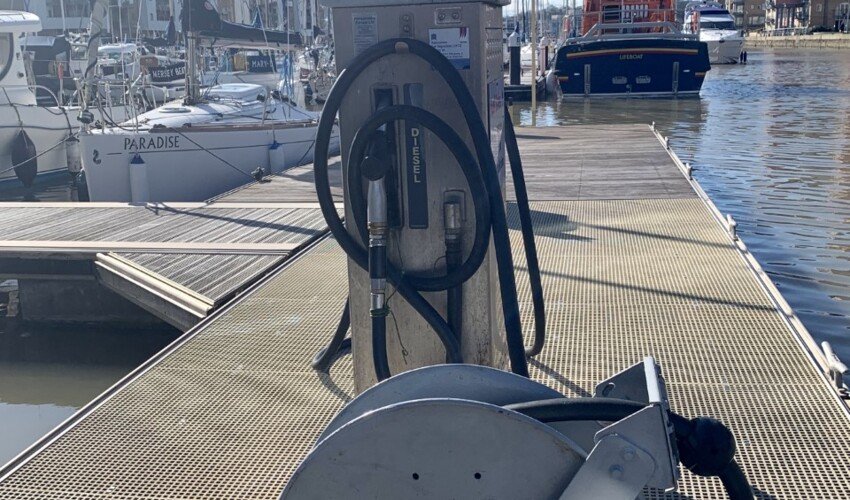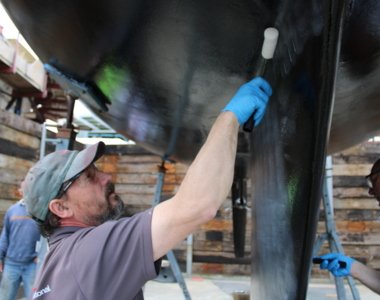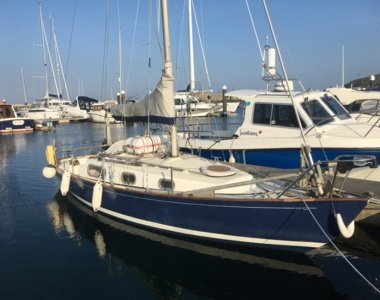-
Bangor Marina Bangor, Northern Ireland
-
Conwy Marina Conwy, North Wales, Wales
-
Deacons Marina River Hamble, Southampton, England
-
East Cowes Marina East Cowes, Isle of Wight, England
-
Haslar Marina Haslar, Portsmouth Harbour, England
-
Penarth Marina Penarth, Cardiff, Wales
-
Portishead Marina Portishead, Bristol, England
-
Portland Marina Portland, Dorset, England
-
Rhu Marina Rhu, Firth of Clyde, Scotland
-
Royal Quays Marina Royal Quays, North Shields, England
-
Weymouth Marina Weymouth, Dorset, England

25th February 2024
Marina Safety Spotlight: Fuel
With the exception of our Atlantic and gig rowing boats, every vessel in our marina boasts an engine hungry for some combustible "go-go juice." Unless you have embraced the eco-friendly allure of e-power, fuel handling demands attention. After all, petrol's volatile nature and diesel's sneaky flammability require a deft touch.
Storage
- Container Caution: Opt for fuel-specific containers with secure lids to prevent leaks.
- Sunlight Sensitivity: Shield your fuel from direct sunlight, especially petrol, and monitor container expansion in warmer temperatures.
- Ventilation Vigilance: Store fuel in well-ventilated lockers, steering clear of living spaces, because, let's be honest, no one wants a whiff of diesel with their dinner!
- Cold Weather Prep: Keep fuel tanks and containers topped up during colder months to stave off condensation and potential fuel contamination.
At the fuel berth
- Ignition Inspection: Before refuelling, ensure all ignition sources are snuffed out. No engines, no phones, no smoking – you may be taking on diesel, but we also have several petrol lines on our fuel dock.
- Spill-Ready: Keep a mini spill kit handy for quick clean-ups, and consider the humble nappy as a surprisingly effective absorbent pad!
- Drip Defence: Deploy a "doughnut" of paper towel laced with washing up liquid around the filler point and use a clean and dry funnel to catch any stray drips.
- Fuel Gauge Focus: Don't rely solely on pump handles to trip off when you hit the full mark; keep an eye on your fuel gauge and listen for the telltale change in sound as your tank fills.
Oil Spill Response
Rest assured, we've got a robust protocol in place for oil spill emergencies. Our team is trained, our external expert resources are primed and we have additional resources at Portland Port on-hand. Our aim is simple: prevent fuel from sullying our pristine waters. You can help us in this goal by having your own small spill kit onboard and taking care when storing and bunkering fuel.
Troubleshooting
If fuel's escaping from the breather but your tank's not full;
- Slow down the fuel flow
- Pull back the nozzle to allow air to vent from the tank
- Check for any breather blockages
Knowing your tank size and how much fuel you should need to bunker should alert you to any problems.
Most boat owners have had a fuel mishap somewhere in their boating careers, Bee on the marina team owned up to a few past diesel disasters;
"In a previous life I worked for a flotilla company in Greece. The chap manning the fuel bowser just kept going and the lead crew didn't check how much was being pumped in until one of the team went down below and reported diesel lapping over the sole boards... turns out the tank had failed. That was one of the worst trips we did, a week on a stinky, diesel-y boat in the hot Greek sun, I think we all slept on deck!"
Equally, you'll run less of a risk of fuel coming out of the overflow/breather if the pump handle doesn't trip off when your tank is full.
"I was prepping my new boat for the winter and wanted to fill the tank up to prevent condensation in the colder weather. I didn't have a fuel gauge so made a bit of a guess. I realised I'd got it badly wrong when the breather pipe gurgled and spat out half a litre of diesel into my cockpit locker, all over the brand new mooring lines I'd just bought..."
It's also important to periodically inspect your fuel tank and lines for wear and tear;
"After a cold and wet winter ashore, I went down to my previous boat to get her ready for the season. On opening the hatch I was confronted by the lovely whiff of diesel and on closer inspection, my copper fuel lines had corroded through and emptied the entire tank into the bilges. It was huge faff to clean it up and replace the fuel lines, but I was just grateful it had happened ashore and not on the mooring!"
As Bee can attest, a fuel fiasco can turn a sunny sail into a stinky saga! So, heed the tips and may your adventures be as smooth as the sea at dawn.



















